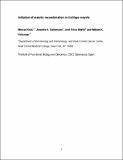Por favor, use este identificador para citar o enlazar a este item:
http://hdl.handle.net/10261/338978COMPARTIR / EXPORTAR:
 SHARE SHARE
 CORE
BASE CORE
BASE
|
|
| Visualizar otros formatos: MARC | Dublin Core | RDF | ORE | MODS | METS | DIDL | DATACITE | |

| Título: | Initiation of meiotic recombination in Ustilago maydis |
Autor: | Kojic, Milorad; Sutherland, Jeanette H.; Pérez-Martín, José CSIC ORCID ; Holloman, William K. | Palabras clave: | Homologous recombination Meiosis Spo11 Cdc45 Teliospore |
Fecha de publicación: | 1-dic-2013 | Editor: | Genetics Society of America | Citación: | Genetics 195(4): 1231-1240 (2013) | Resumen: | A central feature of meiosis is the pairing and recombination of homologous chromosomes. Ustilago maydis, a biotrophic fungus that parasitizes maize, has long been utilized as an experimental system for studying recombination, but it has not been clear when in the life cycle meiotic recombination initiates. U. maydis forms dormant diploid teliospores as the end product of the infection process. Upon germination, teliospores complete meiosis to produce four haploid basidiospores. Here we asked whether the meiotic process begins when teliospores germinate or at an earlier stage in development. When teliospores homozygous for a cdc45 mutation temperature sensitive for DNA synthesis were germinated at the restrictive temperature, four nuclei became visible. This implies that teliospores have already undergone premeiotic DNA synthesis and suggests that meiotic recombination initiates at a stage of infection before teliospores mature. Determination of homologous recombination in plant tissue infected with U. maydis strains heteroallelic for the nar1 gene revealed that Nar+ recombinants were produced at a stage before teliospore maturation. Teliospores obtained from a spo11 Δ cross were still able to germinate but the process was highly disturbed and the meiotic products were imbalanced in chromosomal complement. These results show that in U. maydis, homologous recombination initiates during the infection process and that meiosis can proceed even in the absence of Spo11, but with loss of genomic integrity. | Versión del editor: | http://dx.doi.org/10.1534/genetics.113.156752 | URI: | http://hdl.handle.net/10261/338978 | DOI: | 10.1534/genetics.113.156752 | Identificadores: | doi: 10.1534/genetics.113.156752 issn: 0016-6731 e-issn: 1943-2631 |
| Aparece en las colecciones: | (IBFG) Artículos |
Ficheros en este ítem:
| Fichero | Descripción | Tamaño | Formato | |
|---|---|---|---|---|
| Meiotic_recombinationv3_copia.pdf | 8,88 MB | Adobe PDF |  Visualizar/Abrir |
CORE Recommender
PubMed Central
Citations
2
checked on 22-abr-2024
SCOPUSTM
Citations
7
checked on 28-abr-2024
WEB OF SCIENCETM
Citations
8
checked on 28-feb-2024
Page view(s)
24
checked on 05-may-2024
Download(s)
8
checked on 05-may-2024
Google ScholarTM
Check
Altmetric
Altmetric
Artículos relacionados:
NOTA: Los ítems de Digital.CSIC están protegidos por copyright, con todos los derechos reservados, a menos que se indique lo contrario.
